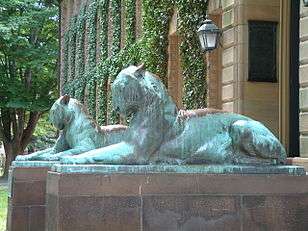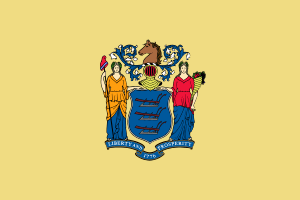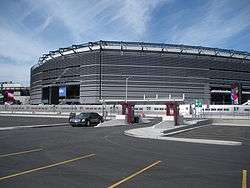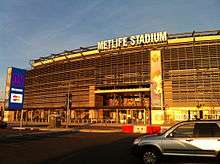Princeton Tigers
| Princeton Tigers | |
|---|---|
 | |
| University | Princeton University |
| Conference |
Ivy League ECAC Hockey Eastern Association of Rowing Colleges Eastern Association of Women's Rowing Colleges Eastern Intercollegiate Volleyball Association Eastern Intercollegiate Wrestling Association |
| NCAA | Division I |
| Athletic director | Mollie Marcoux |
| Location | Princeton, New Jersey |
| Varsity teams | 31 teams |
| Football stadium | Princeton University Stadium |
| Basketball arena | Jadwin Gymnasium |
| Ice hockey arena | Baker Rink |
| Baseball stadium | Bill Clarke Field |
| Soccer stadium | Roberts Stadium |
| Lacrosse stadium | Class of 1952 Stadium |
| Natatorium | Denunzio Pool |
| Other arenas | Shea Rowing Center |
| Mascot | The Tiger |
| Nickname | Tigers |
| Fight song | Princeton Cannon Song |
| Colors |
Black and Orange[1] |
| Website |
www |
The Princeton Tigers are the athletic teams of Princeton University. The school sponsors 31 varsity sports. The school has won several NCAA national championships, including one in men's fencing, six in men's lacrosse, three in women's lacrosse, and eight in men's golf. Princeton's men's and women's crews have also won numerous national rowing championships. The field hockey team made history in 2012 as the first Ivy League team to win the Division I NCAA Championship in field hockey.
Teams
- Men's Sports: | Baseball | Basketball | Crew - Heavyweight | Crew - Lightweight | Cross Country | Fencing | Football | Golf | Hockey | Lacrosse | Rugby | Soccer | Sprint Football | Squash | Swimming & Diving | Tennis | Track & Field | Volleyball | Water Polo | Wrestling
- Women's Sports: | Basketball | Crew - Lightweight | Crew - Open | Cross Country | Fencing | Field Hockey | Golf | Hockey | Lacrosse | Rugby | Soccer | Softball | Squash | Swimming & Diving | Tennis | Track & Field | Volleyball | Water Polo
Baseball
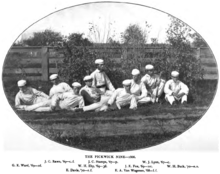
Basketball
Men's basketball
Princeton's basketball team is perhaps the best-known team within the Ivy League. It is nicknamed the "perennial giant killer," a nickname that it acquired during Pete Carril's coaching career from 1967–1996. Its most notable upset was the 1996 defeat of defending NCAA champion UCLA in the tournament's opening round, Carril's final collegiate victory. In 1989, the team almost became the only #16 seed to win, losing to Georgetown 50-49,[2] after leading 29–21 at the half. During that 29-year span, Pete Carril won thirteen Ivy League championships and received eleven NCAA berths and two NIT bids. Princeton placed third in the 1965 NCAA Tournament and won the NIT championship in 1975. The deliberate "Princeton offense" is a legacy of his coaching career. It is employed by a number of other collegiate basketball teams.
From 1992–2001, a nine-year span, the men's basketball team entered the NCAA tournament four times. Notably, the Ivy League has never had an at-large entry in the NCAA tournament. For the last half-century, Princeton and the University of Pennsylvania have traditionally battled for men's basketball dominance in the Ivy League; Princeton had its first losing season in 50 years of Ivy League basketball in 2005. Princeton tied the record for fewest points in a Division I game since the 3-point line started in 1986–87 when they scored 21 points in a loss against Monmouth University on December 14, 2005.
The 1924–25 team was retroactively named the national champion by the Helms Athletic Foundation and the Premo-Porretta Power Poll.[3]
Women's basketball
Princeton's Varsity Women's basketball program is the strongest in the Ivy League, carrying on the tradition of the men's championship basketball program. At no time was the women's team better than it was in 2015, with a 31-0 record, a national NCAA Division 1 ranking among the top 25 teams, and entering the field of 32 teams remaining in the 2015 NCAA Women's Division I Basketball Tournament. Courtney Banghart, a Dartmouth graduate, is entering her tenth season as the Tigers' highly esteemed head coach.[4]
Football

The football team has competed since 1869 and played in the first game against Rutgers University. They have won 24 national championships when the school competed in what is now known as the FBS.[5] Twenty-one former players have been inducted into the College Football Hall of Fame.
The first football game played between teams representing American colleges was an unfamiliar ancestor of today's college football because it was played under soccer-style London Football Association rules. The game, between Rutgers College (now Rutgers University) and the College of New Jersey (now Princeton University), took place on November 6, 1869 at College Field (now the site of the College Avenue Gymnasium at Rutgers University) in New Brunswick, New Jersey. Rutgers won by a score of six "runs" to Princeton's four. The 1869 game between Rutgers and Princeton is notable because it is the first documented game of any sport called "football" between two American colleges. It is also noteworthy because it occurred two years before a codified rugby game would be played in England. The Princeton/Rutgers game was significantly different from American rules football today but, nonetheless, it was the first inter-collegiate football contest in the United States. Another similar game took place between Rutgers and Columbia University in 1870 and a third notable game took place between Tufts University and Harvard University in 1875. The popularity of intercollegiate competition in football would spread throughout the country shortly thereafter.
Though Princeton is no longer a part of Division I Football Bowl Subdivision, the Tigers have the most overall national championships of any team in major college football history with 24 consensus and non-consensus national championships dating all the way back to their first one, shared with Rutgers, in 1869.[6]
Since 1901, however, they have 4 consensus national championships, which ranks as tied for 11th all time.
Princeton's football helmets are also the basis for Michigan Wolverines football team's famed winged helmets, as introduced by Fritz Crisler, the coach at Princeton before he was hired as the coach of The University of Michigan.
Sprint
In addition to the varsity Tigers, Princeton, like a number of other Ivy League schools, also fielded a sprint football squad for players 172 pounds and lighter from 1934 to 2015. The lightweight Tigers won at least a share of the league title eight times, five of those being from between 1937 and 1942. Their last championship, split with the Army Cadets, came in 1989. The Tigers sprint squad collapsed in 1999, which began a losing streak that spanned parts of 17 seasons and 106 games (a collegiate football record), including at least four forfeits; by the end of the 2015 season, Princeton's athletics department determined that the addition of several schools whose sole football team was a sprint squad (and thus were teams that could get all of the best players at their respective schools) and the loss of most of the Ivy League schools, along with the inability of Princeton to recruit more and better players for the team without compromising its other athletic programs, meant that the team would likely be hopelessly outmatched and that this would pose a safety hazard for the players they could recruit. This conclusion led Princeton to drop sprint football in April 2016.
Golf
Men's golf
The men's golf team have won 12 national championships: 1914, 1916, 1919–20, 1922–23, 1927–30, 1937, and 1940 (tied with LSU). They have had seven NCAA individual champions: Louis Bayard, Jr. (1987), Percy Pyne (1899), Frank Reinhart (1903), Albert Seckel (1909), Simpson Dean (1921) and George Dunlap (1930 and 1931). They have won the Ivy League title 29 times: 1928, 1930, 1938–39, 1947, 1961, 1969, 1972, 1973, 1976, 1977, 1979, 1980, 1981, 1982, 1986, 1987, 1989, 1992, 1993, 1994, 1995, 2000, 2001, 2002, 2004, 2005, 2006, 2013.[7]
Women's golf
The women's golf team was founded as a club sport in 1978, coached by Betty Whelan. A group called "Friends of Women's Golf" began fundraising immediately, and the group began lobbying for inclusion as a varsity sport. After ten years of being denied varsity status by the university, representatives from the team contacted the ACLU asking for assistance and raising the possibility of a lawsuit under the protections of Title IX of the Civil Rights Act. In 1991, the university committed to supporting a varsity women's golf program.[8] After becoming a varsity team, women's golf too the Northeast championships in 1995, and Mary Moan won the first Ivy League individual championship in 1997. The team won its first Ivy League title in 1999.[9]
Ice hockey
Men's ice hockey
Women's ice hockey
Lacrosse
Men's lacrosse
The university's men's lacrosse team has enjoyed significant success since the early 1990s and is widely recognized as a perennial powerhouse in the Division I ranks. The team has won thirteen Ivy League titles (1992, 1993, 1995–2004, 2006) and six national titles (1992, 1994, 1996–1998, 2001).[10]
Women's lacrosse
The Princeton Tigers women's lacrosse team has enjoyed much success, winning 3 NCAA championships, tied for 3rd place with Virginia in the number of NCAA championships won.They won NCAA division 1 titles in 1994, 2002, and 2003. Their record in the NCAA tournament finals is 3-4.
Rowing
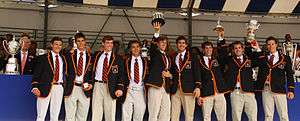
Rowing was introduced to Princeton in 1870 by a handful of undergraduates who bought two old boats with their own funds and formed an impromptu "navy" on the Delaware and Raritan Canal.[11] The construction of Lake Carnegie in 1906 enabled the sport to expand and laid the foundation for today's rowing program at Princeton. More recently, an $8 million upgrade and expansion of the existing boathouse in 2000 formed Shea Rowing Center, one of the finest rowing facilities in the country.
With 150 athletes, 60 rowing shells, and 12 coaches, trainers, and boat riggers, crew is the largest varsity sport at Princeton, and one of the most successful. In recent years, from 2000 through 2010, Princeton varsity crews (both men's and women's) won a total of 14 Eastern Sprints, IRA (national), and NCAA championships, as well as two international events at Henley Royal Regatta.
The Princeton boathouse is often a summer base for U.S. national teams in training, and many Princeton rowers and coaches have gone on to compete at the World Rowing Championships and the Olympics.
Men's heavyweight crew
Men's lightweight crew
- See also: Eastern Association of Rowing Colleges (EARC) and Goldthwait Cup
Main article under construction: Princeton Tigers Men's Lightweight Crew
Women's open crew
- See also: Eastern Association of Women's Rowing Colleges (EAWRC)
Rugby
Men's rugby
Ivy League Champions in 2004, 1979, 1977, 1973, 1971 and 1969.
Women's rugby
National champions in 1995 and 1996. Princeton women advanced to the Final Four in 1997, 1999, 2000, 2001, 2004 and 2005. 32 Princeton women have been named All-Americans.
Soccer
Men's soccer
Before the NCAA began its tournament in 1951, the annual national champion was declared by the Intercollegiate Association Football League (IAFL) — from 1911 to 1926 — and then the Intercollegiate Soccer Football Association (ISFA), from 1927 to 1958. From 1911 to 1958, Princeton won seven national championships.
Women's soccer
In 2004, the women's soccer team went to the Final Four in the NCAA tournament. It became the only Ivy League team (men's or women's) to do so in a 64-team tournament.
Softball
Princeton's softball team appeared in two Women's College World Series in 1995 and 1996.[12]
Squash
Princeton's men's and women's squash teams have earned a strong reputation during the past decade.
Men's squash
The men have won the Ivy League championship from 2006–2008 and have placed second nationally in five of the past seven championships. On February 19, the Tigers defeated the Trinity Bantams in a 5-4 thriller. The Bantams had won the past 13 National Championship and up until a few weeks prior to the Championship, had won 252 matches straight (before falling to Yale 5-4). The Tigers were undefeated in the Ivy League in 2012 and won the Ivy League championship. They were also the winner of the Sloane Sportsmanship award.
Swimming and Diving
Men's swimming and diving
The men have won the Ivy League Championships from 2009-2013. They are coached by the fearless leader C. Rob Orr. In 2015, the men's team won their 30th title in program history.[13]
Women's swimming and diving
Led by Twitter celebrity, Rolls Boyce, the women have dominated the past decade.
Track and field
Women's track and field
Princeton's women's track & field team has also enjoyed great success under Head Coach Peter Farrell.
Volleyball
Men's volleyball
The men's volleyball program achieved varsity status in 1997 - though it had competed for two decades as a club sport before then - and competes in the Eastern Intercollegiate Volleyball Association.[14] From their inaugural varsity season until 2009, the team was coached by Glenn Nelson, who was also the head coach of the Princeton women's volleyball team.
The Tigers have the honor of being the only team since the formation of the EIVA in 1988 to win the EIVA championship and advance to the NCAA Men's National Collegiate Volleyball Championship, with every other title having been won by the Penn State Nittany Lions. The Tigers bested the Nittany Lions in the 1998 EIVA semifinals, then when on to beat Rutgers-Newark, thus winning the 1998 EIVA championship and automatically gaining a berth in the NCAA tournament.
Since then, Princeton has failed to obtain the championship but has nevertheless remained competitive in its conference. Led by head coach Sam Shweisky,[15] the Tigers have had consistent success in the past five years, boasting a positive record for every year of his tenure.[16] Furthermore, Princeton has had victories over five ranked opponents in that time, compared to only three in the previous three years.[16]
The Tigers have had three players earn All-American honors - Marin Gjaja '91, Derek Devens '98 and Cody Kessel '14.
Women's volleyball
The Princeton women's volleyball team has won thirteen Ivy League titles and, in 1998, its men's volleyball team became the first non-scholarship school to make the NCAA Final Four in 25 years.
Wrestling
With a history of over a century, the Princeton Tiger Wrestling team began in 1905. The Princeton wrestling team competes in Dillon Gym, an arena once dominated by the historic basketball icon Bill Bradley. However, the Princeton wrestling team has plenty of historic moments within its own facilities.
Jadwin Gym has served host to five previous EIWA Championships (1969, 1979, 1981, 1987 and 2012), as well as both the 1975 and 1981 NCAA Wrestling Championships. The current head coach is Chris Ayres. Within Jadwin Gym is the Class of 1958 Wrestling Room, home of both the coaching staff and the practice mats.[17]
With 51 Princeton wrestlers have combined to make a total of 75 appearances at the NCAA Wrestling Championships. Bradley Glass won the unlimited title in 1951, marking Princeton's only NCAA champion in the sport. Seven Princeton wrestlers have made three trips to the NCAAs
The Wrestling tigers give out end of the season team awards for the following categories:[18]
- The Hooker Trophy - Awarded annually to that freshman member of the Princeton wrestling squad who has shown the greatest improvement during the season.
- The Gifford Trophy - In memory of Joseph T. Gifford ’39. Awarded annually to that member of the Princeton varsity wrestling team who has scored the most points in competition during the season.
- The Treide Trophy - In honor of George B. Treide ’36. Awarded annually to that member of the Princeton varsity wrestling team who by his spirit, ability and sportsmanship has contributed most to the sport.
NCAA team championships
As of July 2, 2016, Princeton has 24 NCAA team national championships.[19]
- Men's (19)
- Women's (4)
- Field Hockey (1): 2012
- Lacrosse (3): 1994, 2002, 2003
- Co-ed (1)
- Fencing (1): 2013
† The NCAA started sponsoring the intercollegiate golf championship in 1939, but it retained the titles from the 41 championships previously conferred by the National Intercollegiate Golf Association in its records.
- see also:
Facilities
- See footnote[20]
The stadium is Princeton University Stadium, which replaced Palmer Stadium. Baseball is played at Bill Clarke Field. Basketball is played at Jadwin Gymnasium. Ice hockey is played at Baker Rink. Soccer is played at Roberts Stadium. Lacrosse is played at Class of 1952 Stadium. The men's and women's volleyball teams and the wrestling team compete at Dillon Gymnasium. All crews train at Shea Rowing Center and compete on Lake Carnegie. The Rugby Team plays at Rickerson Field on West Windsor Fields.
Top athletes of the decade
2000-2009
1. Matty Bowman [21]
See also
- List of NCAA schools with the most Division I national championships
- List of college athletic programs in New Jersey, USA#Division I
- List of Princeton University Olympians
References
- ↑ "Athletics Logos". GoPrincetonTigers.com. Retrieved 2016-04-01.
- ↑ John Branch, "Carril is Yoda to Notion of Perpetual Motion," New York Times, March 30, 2007
- ↑ ESPN, ed. (2009). ESPN College Basketball Encyclopedia: The Complete History of the Men's Game. New York, NY: ESPN Books. p. 537. ISBN 978-0-345-51392-2.
- ↑ Princeton Alumni Weekly PAW January 2015, New York Times, January 2015
- ↑ http://www.cfbdatawarehouse.com/data/national_championships/mel_smith/football_style.php
- ↑ "Recognized National Championships by Team". College Football Data Warehouse. Retrieved 2009-08-01.
- ↑ "Men's Golf Record Book – Coaching Records & Program Facts". Retrieved June 12, 2013.
- ↑ "Women's Golf at Princeton Records 1979-2011". Princeton University Library Finding Aids. Princeton University LIbraries. Retrieved 19 October 2012.
- ↑ Welch, Paula D. (1999). Silver Era, Golden Moments: A Celebration of Ivy League Women's Athletics. Lanham, Maryland: Madison Books. p. 148. ISBN 1-56833-128-2.
- ↑ Welcome to the World of Princeton Lacrosse
- ↑ Leitch, Alexander (1978). A Princeton Companion. Princeton University Press.
- ↑ Plummer, William; Floyd, Larry C. (2013). A Series Of Their Own: History Of The Women's College World Series. Oklahoma City, Oklahoma, United States: Turnkey Communications Inc. ISBN 978-0-9893007-0-4.
- ↑ http://www.ivyleaguesports.com/sports/mswimdive/2014-15/releases/Princeton_Claims_30th_Mens_Swimming-Diving_Championship
- ↑ http://www.goprincetontigers.com/ViewArticle.dbml?DB_OEM_ID=10600&ATCLID=209387578
- ↑ http://www.princetonvolleyball.com/head-coach.cfm
- 1 2 http://www.goprincetontigers.com/ViewArticle.dbml?DB_OEM_ID=10600&ATCLID=204927205
- ↑ "Princeton Wrestling Facilities". Princeton Tiger Athletics. Retrieved 2014-01-01.
- ↑ "Team Wrestling trophies" (PDF). Princeton Wrestling. Retrieved 2014-01-01.
- ↑ http://fs.ncaa.org/Docs/stats/champs_records_book/Overall.pdf
- ↑ Princeton Facilities. GoPrincetonTigers.com (Princeton University Athletics official website). Princeton University. Retrieved 2011-09-10.
- ↑ "Top 10 Male and Female Athletes of the Decade". Princeton Athletic Communications. December 15, 2009. Retrieved 2010-02-02.
External links
| Wikimedia Commons has media related to Princeton University athletics. |
